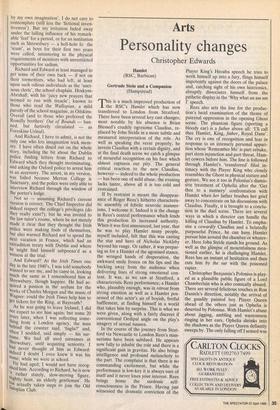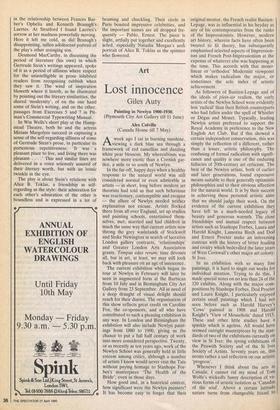Arts
Personality changes
Christopher Edwards
Hamlet (RSC, Barbican) Gertrude Stein and a Companion (Hampstead) rr his is a much improved production of 1 the RSC's Hamlet which has now transferred to London from Stratford.
There have been several key cast changes; most notable by his absence is Brian Blessed's crudely ogresome Claudius, re- placed by John Stride in a more subtle and measured interpretation of the role. As well as speaking the verse properly, he invests Claudius with a certain dignity, and at the final death scene we catch a glimpse of mournful recognition on his face which
almost captures our pity. The general critical reaction to the new Claudius, however — indeed to the whole production — has been one of mild abuse; the evening lacks lustre, above all it is too cold and restrained.
If by restraint is meant the disappear- ance of Roger Rees's hitherto characteris- tic assembly of febrile neurotic manner- isms, I welcome it. Indeed it is the change in Rees's central performance which lends this production its increased authority. When it was first announced, last year, that he was to play Hamlet many people, myself included, felt that this was casting the star and hero of Nicholas Nickleby beyond his range. Or rather, it was prepar- ing us for a Hamlet of the agonised stance, the wringed hands of desperation, the awkward smile frozen on his lips and the backing away from the audience when delivering lines of strong emotional con- tent. It was, as we saw at Stratford, a characteristic Rees performance; a Hamlet who. plausibly enough, was in retreat from strong emotion as well as a Hamlet pos- sessed of this actor's air of boyish, fretful bafflement, at finding himself in a world that takes him by surprise. This is what we were given, along with a fairly discreet if conventional Oedipal angle on the play's imagery of sexual nausea.
In the course of the journey from Strat- ford via Newcastle to London Rees's man- nerisms have been subdued. He appears now fully to inhabit the role and there is a significant gain in gravitas. He also brings intelligence and profound melancholy to the part. The complaint is that there is no commanding excitement, but while the performance is low-key it is always sure of itself and it never loses your interest. Rees brings home the sardonic self- consciousness in the Prince. Having just witnessed the dramatic conviction of the Player King's Hecuba speech he tries to work himself up into a fury, flings himself impotently against the doors of the palace and, catching sight of his own histrionics, abruptly dissociates himself from the pathetic display in the 'Why what an ass am I' speech.
Rees also sets the line for the produc- tion's lucid examination of the theme of paternal oppression in the opening Ghost scene. The phantom figure (sporting a bloody ear) is a father above all: 'I'll call thee Hamlet, King, father, Royal Dane'. The cry is one of recognition and fear in response to an intensely personal appari- tion whose 'Remember Me' is part rebuke, part stern injunction and part threat. Ham- let cowers before him. The line is followed through Hamlet's 'transferred' filial in- timacy with the Player King who closely resembles the Ghost in physical stature and gesture. We see it too in Polonius's dismis- sive treatment of Ophelia after the 'Get thee to a nunnery' confrontation with Hamlet when her father brushes her grief away to concentrate on his discussions with Claudius. Finally, it is brought to a conclu- sion in the duel scene. There are several ways in which a director can handle the killing of Claudius by Hamlet. To empha- sise a cowardly Claudius and a belatedly purposeful Prince, he can have Hamlet pursue him around the chamber or whatev- er. Here John Stride stands his ground. As well as the glimpse of mournfulness men- tioned earlier, he is challenging Hamlet. Rees has an instant of hesitation and then cuts him by the ear with the poisoned rapier.
Christopher Benjamin's Polonius is play- ed as a plausible public figure of a Lord Chamberlain who is also comically absurd.
There are several felicitous touches in Ron Daniels's direction, notably the arrival of the gaudily painted boy Player Queen ahead of the others just as Ophelia is deserted by Polonius. With Hamlet's abuse
about jigging, ambling and wantonness ringing in her ears, Ophelia shrinks into the shadows as the Player Queen defiantly sweeps by. The only falling off I sensed was
in the relationship between Frances Bar- ber's Ophelia and Kenneth Branagh's Laertes. At Stratford I found Laertes's sorrow at her madness powerfully moving. Here it left me cold, as did Branagh's disappointing, sullen adolescent portrait of the play's other avenging son.
Desmond MacCarthy, in discussing the period of literature (his own) in which Gertrude Stein's writings appeared, spoke of it as a period of silliness where respect for the unintelligible in prose inhibited readers from recognising rubbish when they saw it. The wind of inspiration bloweth where it listeth, as he illustrated by pointing out the literary similarities, the shared 'modernity', of on the one hand some of Stein's writing, and on the other, passages from Exercises 5 and 7 in Pit- man's Commercial Typewriting Manual.
In Win Wells's short play at the Hamp- stead Theatre, both he and the actress Miriam Margolyes succeed in capturing a sense of the self-regarding silliness of some of Gertrude Stein's prose, in particular its portentous repetitiveness: `It was a pleasant place to live, and living there was pleasant . . . .' This and similar lines are delivered in a voice solemnly assured of their literary worth, but with an ironic twinkle in the eye.
The play is about Stein's relations with Alice B. Toklas, a friendship as self- regarding as the style: their admiration for each other's admiration of the other is boundless and is expressed in a lot of beaming and chuckling. Their circle in Paris boasted impressive celebrities, and the important names are all dropped fre- quently — Pablo, Ernest. The piece is slight, artfully put together and excellently acted, especially Natasha Morgan's arch portrait of Alice B. Toklas as the spinster who flowered.



















































 Previous page
Previous page